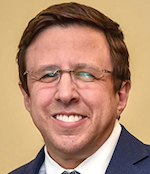 |
| David Ball |
Within moments of taking the podium in the James S. Brady Press Briefing Room—and mere hours into the Biden administration—White House press secretary Jen Psaki had demonstrated her competence and character. Her handling of that briefing signaled to the media and the world that change had come to the White House.
The role of White House press secretary is the world’s toughest public relations job. Staying “on message” is very difficult, given the ability of unfolding events to force unforeseen pivots.
It’s incumbent on the press secretary and her team to diligently respond to the barrage of media inquiries so that readers and viewers of news outlets big and small can better understand the administration’s work.
Having served as a government press secretary for several years—albeit nowhere near the White House—makes assessing the potential of a press secretary a little easier, though certainly not foolproof.
In a single briefing, Psaki was able to make clear that President Biden would strive for transparency and that truth would be the standard, even if doing so would mean more instances of “I’ll research that and get back to you.”
It’s a refreshing contrast after a string of press secretaries who viewed their role as conveying their boss’ narrative—even when that narrative clearly contradicted the facts—treating journalists as enemies of the people or seeking to use favoritism with journalists to strategic ends.
Here are five things that Psaki did that earned the confidence of those in the room and viewers around the globe.
The truth matters. No press secretary or PR professional can ever achieve success in their job by lying. Yes, their job is to present the facts that support the administration’s agenda and to deflect on inquiries that could harm public opinion, but these efforts must always be grounded in fact. Good journalists always find their way to the unbridled truth; creating “alternative facts” will not only fail, it will destroy the spokesperson’s credibility as well as the credibility of their bosses.
Do as I do, not just as I say. By wearing two masks (including an N95), Psaki demonstrated her commitment to the policy she was announcing that day—the mask mandate in federal buildings and elsewhere—and made a broader statement through her actions about this administration and for that which it stands.
Be prepared. When you’re thoroughly prepared for press conferences and media availabilities, it shows. Psaki was prepared to answer most questions, often referring to a briefing bookmarked up with notes. It was the first day on the job, and while she employed it once or twice, she did not heavily rely on the “hey, I’m new here” approach.
Consistency is key. Psaki was clear that the daily briefing has returned—emphasis on daily. She vowed to return the next day and to follow up on those questions she could not answer—or didn’t want to answer—in the moment. Journalism is deadline-driven. When my father quit his job as a city editor, the first thing he did was tuck his wristwatch in a dresser drawer and vow never to wear one again. (The downside was that every place I went with him as a child, he was always asking strangers for the time.) In media relations, a best practice is to always respect the journalist’s deadline, and press secretaries must strike a balance between providing basic details and showing their cards for all to see. Providing regular access to information is important.
Being polite never hurts. In any crisis situation, a PR pro should view journalists as adversaries. The work they seek to do may damage your client, particularly in the presence of bad facts. That doesn’t mean you can’t treat them professionally. Psaki gets points for calling on journalists by name and for being even-handed: foreign reporters were called on as well as American journalists and outlets were not discriminated on based on the political leanings of their commentary. In other words, the press secretary for a Democratic president called on the Fox correspondent and politely responded.
Time will tell how Jen Psaki performs as White House press secretary, but the early indicators are very strong.
***
David A. Ball is the president and founder of Ball Consulting Group, LLC, a strategic communications firm in the Boston area. He began his PR career in the administration of former Massachusetts Governor Bill Weld.


 The ridiculously high prices Americans are paying at the supermarket might influence how—or if—they vote in November.
The ridiculously high prices Americans are paying at the supermarket might influence how—or if—they vote in November. At a moment in history when there are so many conflicts among peoples here and abroad, let us put our differences aside and celebrate this wonderful season in a spirit of togetherness.
At a moment in history when there are so many conflicts among peoples here and abroad, let us put our differences aside and celebrate this wonderful season in a spirit of togetherness. The news announcing the death of Henry Kissinger, the last of the prevaricating politicians and so-called statesmen who stole my future and that of thousands of other young Americans, got me thinking about Walter Cronkite.
The news announcing the death of Henry Kissinger, the last of the prevaricating politicians and so-called statesmen who stole my future and that of thousands of other young Americans, got me thinking about Walter Cronkite.


 Have a comment? Send it to
Have a comment? Send it to 
Jan. 26, 2021, by Joe Honick
Mr Ball is absolutely on target about her performance. Contrary to the FOX inevitable manipulation of facts, she was firm, polite and even informative, more so than the media and the public might have expected at this early point when the new administration has to deal with a fleeing ex president and his bunch. Kudos to Biden for selecting her, Psaki for qualifying and Ball for saying so.